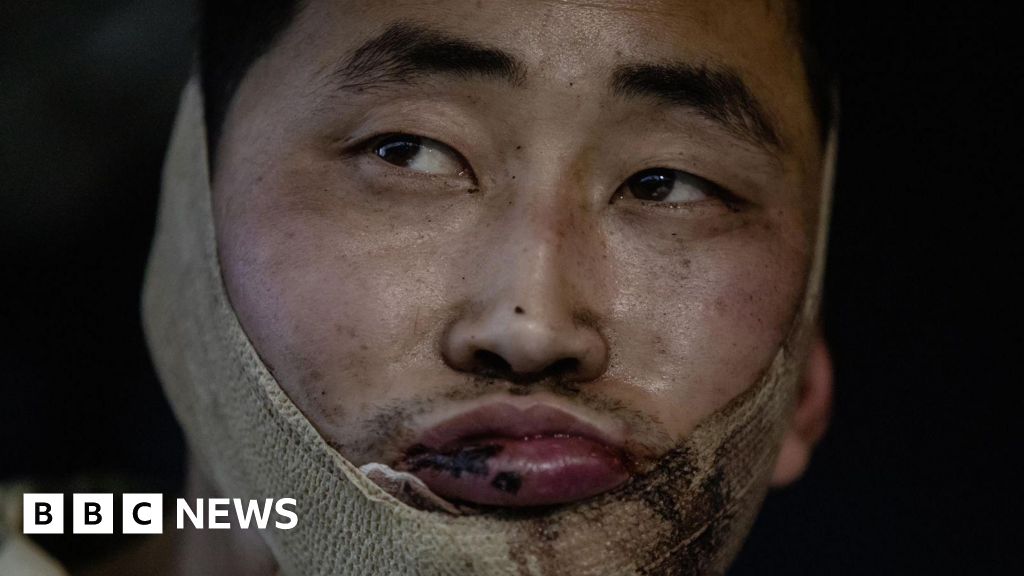Two wounded North Korean soldiers were captured as prisoners of war by Ukrainian troops in Russia’s Kursk Oblast, President Volodymyr Zelensky said Saturday.
Both men are receiving “necessary medical assistance” and are in the custody of the Security Service of Ukraine (SBU) in kyiv, according to Zelensky.
The president said he was “grateful” to Ukrainian paratroopers and special operations forces soldiers for capturing the North Koreans.
He added that “it was not an easy task,” saying that Russian and North Korean soldiers usually execute wounded North Koreans “to erase any evidence of North Korea’s involvement in the war against ‘Ukraine’.
Ukrainian intelligence said in a statement that the prisoners were captured on January 9 and immediately afterwards “received all necessary medical care, as stipulated by the Geneva Convention”, and taken to kyiv.
“They are detained in appropriate conditions that meet the requirements of international law,” the intelligence statement said.
Intelligence said the prisoners do not speak Ukrainian, English or Russian, so “communication with them is done through Korean interpreters, in cooperation with South Korea’s NIS (National Intelligence Service).
In a statement posted to Telegram and
“The world needs to know the truth about what is happening,” he added.
Zelensky also released four photographs alongside his statement. Two men injured. One of the photos showed a red Russian military card.
The place of birth indicated on the document is Turan, in the Republic of Tuva, close to Mongolia.
Intelligence said that when the prisoners were captured, one of the soldiers had a Russian military ID card issued in the name of another person registered in the Republic of Tuva. The other had no documents.
Intelligence said that during interrogation, the soldier with the ID card told security personnel that the document was issued to him in Russia during the fall of 2024.
He reportedly said that at that time, some North Korean combat units were undergoing a week-long interoperability training.
“It should be noted that the prisoner…emphasizes that he was supposed to undergo training and not wage a war against Ukraine,” the SBU statement said.
Intelligence reported that he said he was born in 2005 and had been serving in North Korea as a rifleman since 2021.
The second prisoner allegedly gave some of his answers in writing because his jaw was injured, according to the SBU. Intelligence said it believed he was born in 1999 and had served in North Korea as a sniper since 2016.
The Geneva Convention states that interrogation of detainees must take place in a language they understand and that prisoners must be protected from public curiosity.
Zelensky’s office said in a statement that the Russians are “trying to hide the fact that these are North Korean soldiers by giving them documents claiming that they come from Tuva or other territories under the control of Moscow”.
“But these people are actually Koreans, they come from North Korea,” the statement from the president’s office said.
In 2014, Russian forces operating in Ukraine – despite Kremlin denials – were sent without identification markings on their uniforms.
Last year, when President Vladimir Putin was asked about Russia’s use of North Korean troops in its war against Ukraine, he did not deny it. He said it was a “sovereign decision” by Russia.
In December, South Korean intelligence reported that North Korean soldier believed to have been first captured while supporting Russian war in Ukraine has died after being captured alive by Ukrainian forces.
Separately, the White House said North Korean forces were suffering high casualties.
The Ukrainian security services said that they are “currently carrying out the necessary investigative measures to establish all the circumstances of the participation of the DPRK army in Russia’s war against Ukraine.”
“The investigation is carried out under the procedural guidance of the Prosecutor General’s Office under Article 437 of the Criminal Code of Ukraine (planning, preparation, initiation and conduct of aggressive war).”





